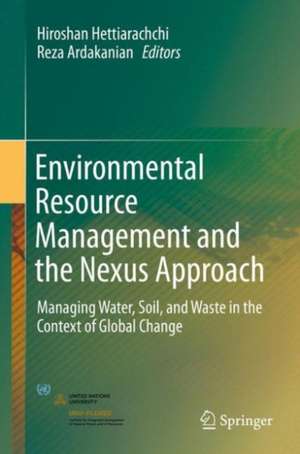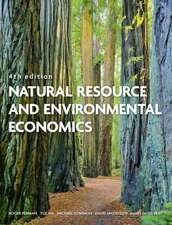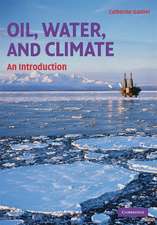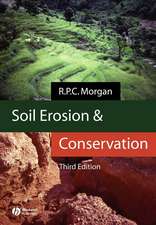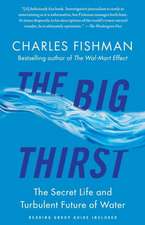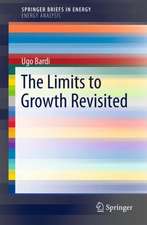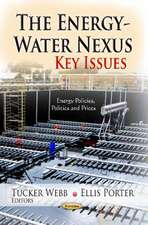Environmental Resource Management and the Nexus Approach: Managing Water, Soil, and Waste in the Context of Global Change
Editat de Hiroshan Hettiarachchi, Reza Ardakanianen Limba Engleză Hardback – 18 apr 2016
Taking as its point of departure the thematic discussions of the Dresden Nexus Conference (DNC 2015) held in March 2015, the book presents the perspectives of a number of thought leaders on how the nexus approach could contribute to sustainable environmental resource management.
The first chapter provides an introduction to the issues and consent of the book. Chapters 2 and 3 focus on climate change adaptation. Chapters 4 and 5 discuss the role of urbanization as a main driver of global change. The last two chapters of the book present ideas on how the nexus approach may be used to cope with population growth and increased demand for resources.
| Toate formatele și edițiile | Preț | Express |
|---|---|---|
| Paperback (1) | 576.27 lei 38-44 zile | |
| Springer International Publishing – 22 apr 2018 | 576.27 lei 38-44 zile | |
| Hardback (1) | 706.16 lei 22-36 zile | |
| Springer International Publishing – 18 apr 2016 | 706.16 lei 22-36 zile |
Preț: 706.16 lei
Preț vechi: 830.77 lei
-15% Nou
Puncte Express: 1059
Preț estimativ în valută:
135.13€ • 141.44$ • 112.47£
135.13€ • 141.44$ • 112.47£
Carte disponibilă
Livrare economică 10-24 martie
Preluare comenzi: 021 569.72.76
Specificații
ISBN-13: 9783319285924
ISBN-10: 3319285920
Pagini: 220
Ilustrații: VI, 209 p. 35 illus., 29 illus. in color.
Dimensiuni: 155 x 235 x 15 mm
Greutate: 0.68 kg
Ediția:1st ed. 2016
Editura: Springer International Publishing
Colecția Springer
Locul publicării:Cham, Switzerland
ISBN-10: 3319285920
Pagini: 220
Ilustrații: VI, 209 p. 35 illus., 29 illus. in color.
Dimensiuni: 155 x 235 x 15 mm
Greutate: 0.68 kg
Ediția:1st ed. 2016
Editura: Springer International Publishing
Colecția Springer
Locul publicării:Cham, Switzerland
Public țintă
ResearchCuprins
1. Managing Water, Soil, and Waste in the Context of Global Change (Hiroshan Hettiarachchi).- Part 1. Climate Change Adaptation.- 2. Climate Change Impacts and Adaptation in Water and Land Context (Zbigniew Kundzewicz).- 3. Climate Change, Profligacy, Poverty and Destruction: All Things are Connected (Brian Moss).- Part 2. Urbanization as a Main Driver of Global Change.- 4. A Nexus Approach to Urban and Regional Planning Using the Four Capital Framework of Ecological Economics (Robert Costanza).- 5. The Urban Water-Energy Nexus: Building Resilience for Global Change in the ‘Urban Century’ (Christopher A. Scott).- Part 3. Population Growth and Increased Demand for Resources.- 6. Role of Soils for Satisfying Global Demands for Food, Water, and Bioenergy (Winfried E.H. Blum).- 7. Implications of the Nexus Approach when Assessing Water and Soil Quality as a Function of Solid and Liquid Waste Management (Johan Bouma).
Notă biografică
Prof. Dr. Reza Ardakanian is the Founding Director of United Nations University Institute for Integrated Management of Material Fluxes and of Resources (UNU-FLORES). He served as Director of the UN-Water Decade Programme on Capacity Development hosted by UNU (2007–2015) and as Vice-Rector of UNU in Europe, ad interim (2009–2011). He sat on the Boards of various international programmes/organisations such as UNESCO-IHP, UNESCO-IHE, the International Hydropower Association, and UNU-EHS. Prof. Dr. Ardakanian holds a PhD in Water Resources Management from McMaster University (Canada) and is a faculty member of Sharif University of Technology in Tehran, Iran. He formerly held a number of national offices in Iran, including Deputy Minister for Water Affairs (2001–2005), Senior Vice-Minister (1998–2001) and Deputy Minister for Planning & Economic Affairs (1989–1991) with the Ministry of Energy, and Deputy Minister for Urban Development and Municipalities with the Ministry of Interior (1987–1989).
Dr. Hiroshan Hettiarachchi is a civil engineer specialised in geotechnical and geo-environmental engineering. He joined United Nations University Institute for Integrated Management of Material Fluxes and of Resources (UNU-FLORES) as Academic Officer and leads the Waste Management unit. He previously served as Associate Professor at Lawrence Technological University, USA. Dr. Hettiarachchi’s past research is mainly focused on geotechnical aspects of landfills and properties and behaviour of geomaterials. He holds a PhD in Civil Engineering from New Jersey Institute of Technology, USA.
Textul de pe ultima copertă
This book elaborates how water, soil, and waste may be managed in a nexus and how this approach may help combat global change. In addition to providing a brief account on nexus thinking and how it may help us tackle issues important to the world community such as food security, the book presents the environmental resource perspective of three main aspects of global change: climate change, urbanization, and population growth.
Taking as its point of departure the thematic discussions of the Dresden Nexus Conference (DNC 2015) held in March 2015, the book presents the perspectives of a number of thought leaders on how the nexus approach could contribute to sustainable environmental resource management.
The first chapter provides an introduction to the issues and consent of the book. Chapters 2 and 3 focus on climate change adaptation. Chapters 4 and 5 discuss the role of urbanization as a main driver of global change. The last two chapters of the book present ideas on how the nexus approach may be used to cope with population growth and increased demand for resources.
Taking as its point of departure the thematic discussions of the Dresden Nexus Conference (DNC 2015) held in March 2015, the book presents the perspectives of a number of thought leaders on how the nexus approach could contribute to sustainable environmental resource management.
The first chapter provides an introduction to the issues and consent of the book. Chapters 2 and 3 focus on climate change adaptation. Chapters 4 and 5 discuss the role of urbanization as a main driver of global change. The last two chapters of the book present ideas on how the nexus approach may be used to cope with population growth and increased demand for resources.
Caracteristici
Elaborates how water, soil, and waste may be managed in a nexus approach Describes how the nexus approach may help combat global change Reflects how a nexus approach could contribute to better resource management in various contexts
